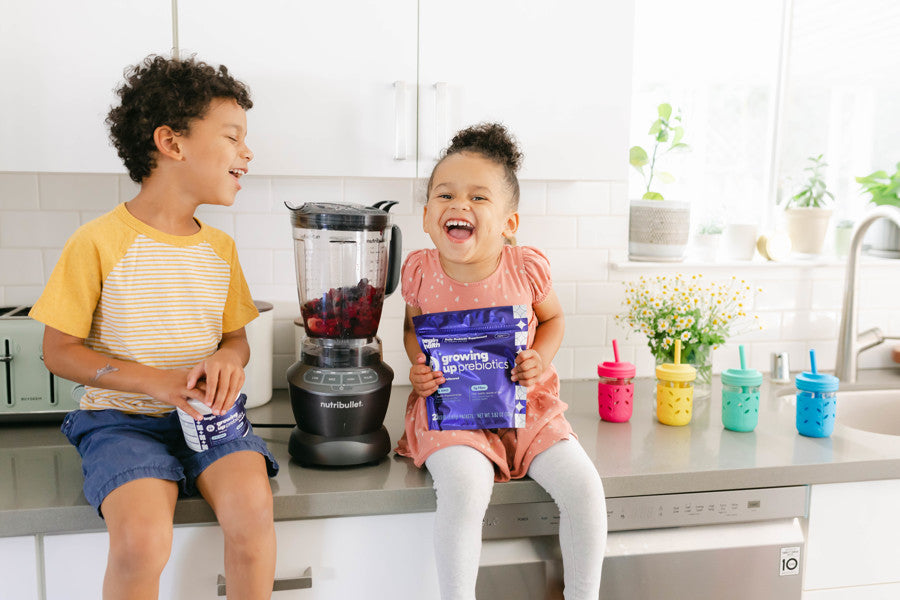Your Cart is Empty
Continue shoppingManaging Kids' Constipation During Travel
Medically Reviewed by May Zhu, RDN | Published December 13, 2023
share this article

Traveling with kids can be a fun and exciting experience. However, the changes in routine, different foods, and altered schedules can sometimes lead to constipation in our little ones. Parents and their little ones both experience the discomfort from their kiddos' digestive complaints due to constipation. Let's dig deeper into how travel impacts bowel movements in kids and explore effective strategies to manage constipation during these times.
How Travel Affects Bowel Movements in Kids
Here are four different ways that traveling can lead to constipation in our kiddos:
-
Altered Routine. Changes in meal times, disrupted sleep schedules, and unfamiliar surroundings can disrupt a kid’s regular bathroom routine. Time differences can also contribute to regularity. Most kiddos and adults have a normal bowel movement routine or have a designated interval for pooping throughout the day. But when jet lag or a new time zone alters that schedule ahead or backwards by a few hours, it can mess up that internal routine, causing constipation.
-
Dietary Changes. Generally, families tend to eat differently on vacation compared to their usual meals at home. Variations in available foods or an increase in processed or unfamiliar foods can impact the fiber content of their diet, affecting bowel movements [1].
-
Dehydration. Inadequate fluid intake during travel, especially if there's limited access to water or a preference for sugary beverages, can contribute to constipation [2].
-
Stress. The stress of traveling can make it more difficult for kiddos to poop while they’re away. Studies refer to the gut as the “second brain” due to the millions of neurons that line the intestines. These cells play a role in digestion and researchers also reveal that anxiety or stress can also affect the way this “second brain” functions [7].
Tips to Manage Constipation During Travel
1. Prioritize Hydration
Encourage your little ones to drink plenty of water throughout the traveling period. Carry a reusable water bottle and offer hydrating fruits like watermelon or cucumbers as snacks, which can also count towards their daily hydration.
2. Pack High-Fiber Snacks
Bring along fiber-rich snacks like apples, pears, or plums to ensure a consistent intake of dietary fiber [3].
Begin Health Expert Tip
Ever heard of the 4 “P” fruits for constipation? Pears, plums, peaches, and prunes can provide a natural laxative effect to help symptoms from constipation. To learn more, check out our blog: The 4 P Fruits for Kids Constipation
3. Maintain Routine as Much as Possible
Stick to familiar meal schedules as closely as you can. Consistency in meal times can help regulate bowel movements by helping the body in anticipating food intake, allowing for more predictable digestive patterns [6].
4. Encourage Movement
Incorporate short breaks for physical activity during travel. Encouraging your little ones to stretch or move around can stimulate bowel movements. Regular exercise not only fosters muscle development but also stimulates intestinal muscles, promoting efficient movement of food through the digestive tract [4].
5. Consider Prebiotics
Introducing prebiotic-rich foods or supplements such as Begin Health’s Growing Up Prebiotics can aid in maintaining a healthy gut microbiome, potentially supporting regularity during travel [5].
Daily reads to help your little ones lead happier and healthier lives.
Buy Now
Join the
Happy Gut Club
Begin Health Expert Tip
Growing Up Prebiotics makes it easy to get prebiotics, even while traveling. It’s tasteless and textureless but provides 3g of daily fiber per serving. Just add to your kiddo’s water bottle or favorite beverage to help them stay regular not only during vacation, but daily at home as well.
6. Address Toilet Anxiety
Kids might feel uncomfortable using unfamiliar toilets. Encourage them to use the restroom when needed, offering reassurance and creating a comfortable environment.
When to Seek Professional Advice
If constipation persists despite these measures or if your kids experience severe discomfort, it's essential to seek guidance from a healthcare professional. A Pediatrician or a Pediatric Registered Dietitian can provide tailored advice for managing constipation during travel specific to your little one’s needs.
Summary
Traveling with kids is a wonderful experience but can pose challenges to their digestive health and lead to travel’s constipation. By proactively addressing potential constipation triggers such as altered routines and dietary changes and implementing simple yet effective strategies like prioritizing hydration, maintaining fiber intake, and encouraging movement, you can help manage constipation during travels.
Remember, every kid is unique and these tips may need additional customization based on your kiddo’s specific dietary needs or medical conditions.

Author
May Zhu, RDN
Trending

How to Transition Kids Off Stool Softeners Safely
read now
How to Know If Your Kid Needs a Stool Softener (or Something Else)
read now
Why Parents Are Choosing Prebiotics Over Stool Softeners for Kids
read now






